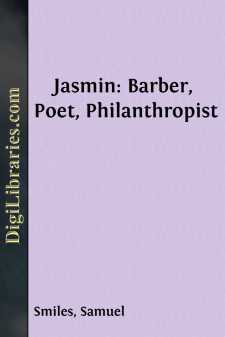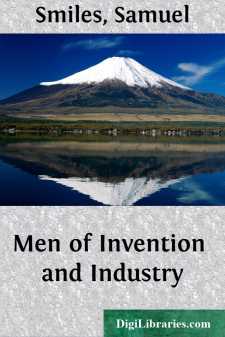Categories
- Antiques & Collectibles 13
- Architecture 36
- Art 48
- Bibles 22
- Biography & Autobiography 813
- Body, Mind & Spirit 141
- Business & Economics 28
- Children's Books 12
- Children's Fiction 9
- Computers 4
- Cooking 94
- Crafts & Hobbies 4
- Drama 346
- Education 46
- Family & Relationships 57
- Fiction 11826
- Games 19
- Gardening 17
- Health & Fitness 34
- History 1377
- House & Home 1
- Humor 147
- Juvenile Fiction 1873
- Juvenile Nonfiction 202
- Language Arts & Disciplines 88
- Law 16
- Literary Collections 686
- Literary Criticism 179
- Mathematics 13
- Medical 41
- Music 40
- Nature 179
- Non-Classifiable 1768
- Performing Arts 7
- Periodicals 1453
- Philosophy 64
- Photography 2
- Poetry 896
- Political Science 203
- Psychology 42
- Reference 154
- Religion 513
- Science 126
- Self-Help 83
- Social Science 81
- Sports & Recreation 34
- Study Aids 3
- Technology & Engineering 59
- Transportation 23
- Travel 463
- True Crime 29
Samuel Smiles
Samuel Smiles was a Scottish author and reformer, best known for his book "Self-Help," published in 1859, which promoted the virtues of hard work, perseverance, and self-reliance. His writings played a significant role in the Victorian ethos of self-improvement and personal responsibility. Smiles also wrote biographies and historical works, further contributing to his reputation as a prominent figure in the literature of self-improvement and moral guidance.
Author's Books:
Sort by:
by:
Samuel Smiles
CHAPTER I. DOWN CHANNEL. At Gravesend—Taking in Stores—First Night on Board—"The Anchor's Up"—Off Brighton—Change of Wind—Gale in the Channel—The Abandoned Ship—The Eddystone—Plymouth Harbour—Departure from England. 20th February: At Gravesend.—My last farewells are over, my last adieus are waved to friends on shore, and I am alone on board the ship...
more...
by:
Samuel Smiles
Since the appearance of this book in its original form, some seventeen years since, the construction of Railways has continued to make extraordinary progress. Although Great Britain, first in the field, had then, after about twenty-five years’ work, expended nearly 300 millions sterling in the construction of 8300 miles of railway, it has, during the last seventeen years, expended about 288...
more...
by:
Samuel Smiles
My attention was first called to the works of the poet Jasmin by the eulogistic articles which appeared in the Revue des Deux Mondes, by De Mazade, Nodier, Villemain, and other well-known reviewers. I afterwards read the articles by Sainte-Beuve, perhaps the finest critic of French literature, on the life and history of Jasmin, in his 'Portraits Contemporains' as well as his admirable article...
more...
by:
Samuel Smiles
CHAPTER I. "A speck in the Northern Ocean, with a rocky coast, an ungenial climate, and a soil scarcely fruitful,—this was the material patrimony which descended to the English race—an inheritance that would have been little worth but for the inestimable moral gift that accompanied it. Yes; from Celts, Saxons, Danes, Normans—from some or all of them—have come down with English nationality a...
more...
by:
Samuel Smiles
CHAPTER I. REVOCATION OF THE EDICT OF NANTES. The Revocation of the Edict of Nantes was signed by Louis XIV. of France, on the 18th of October, 1685, and published four days afterwards. Although the Revocation was the personal act of the King, it was nevertheless a popular measure, approved by the Catholic Church of France, and by the great body of the French people. The King had solemnly sworn, at the...
more...
by:
Samuel Smiles
CHAPTER I.—INFLUENCE OF CHARACTER. "Unless above himself he can Erect himself, how poor a thingis man"—DANIEL. "Character is moral order seen through the medium, of anindividual nature.... Men of character are the conscience ofthe society to which they belong."—EMERSON. "The prosperity of a country depends, not on the abundanceof its revenues, nor on the strength of its...
more...
by:
Samuel Smiles
CHAPTER I. IRON AND CIVILIZATION. "Iron is not only the soul of every other manufacture, but the main spring perhaps of civilized society."—FRANCIS HORNER. "Were the use of iron lost among us, we should in a few ages be unavoidably reduced to the wants and ignorance of the ancient savage Americans; so that he who first made known the use of that contemptible mineral may be truly styled...
more...
by:
Samuel Smiles
CHAPTER I JOHN MACMURRAY OR MURRAY The publishing house of Murray dates from the year 1768, in which year John MacMurray, a lieutenant of Marines, having retired from the service on half-pay, purchased the bookselling business of William Sandby, at the sign of the "Ship," No. 32, Fleet Street, opposite St. Dunstan's Church. John MacMurray was descended from the Murrays of Athol. His uncle,...
more...
by:
Samuel Smiles
CHAPTER I. INDUSTRY. "Not what I have, but what I do, is my kingdom."—Carlyle. "Productive industry is the only capital which enriches a people, and spreads national prosperity and well-being. In all labour there is profit, says Solomon. What is the science of Political Economy, but a dull sermon on this text?"—Samuel Laing. "God provides the good things of the world to serve...
more...










